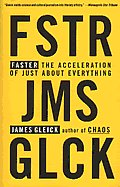Subtitled The Acceleration of Just About Everything, Faster is a book about time and the human perception of time, about the changes in the way that we perceive time and our reactions to being constantly in a hurry. It's one of those topics that sounds immediately appealing (and equally dangerous to write about) due to its recognition factor; few people in modern Western countries haven't felt like there's too much happening, too quickly, and not enough hours in the day. At the same time, it's such a general topic with so different personal causes and effects that it's not easy to write about. Faster suffers from that, feeling random and superficial at times, but it has its moments.
The book is mostly a collection of random tidbits. It's part popular science, part myth debunking, part catalog of curosities, and part philosophical discussion. None of those aspects go very deep, so if you're looking for something in-depth on time keeping, the psychology of sleep-deprivation and stress, or a discussion of how people can successfully slow down and let time pass without worry, you'll be disappointed. Gleick touches on all of those issues and more, but in quick chapters that skip quickly from trivia to trivia. Some of the trivia is interesting; little of it is likely to stick with me.
So far, this sounds less than appealing. In the middle of the book, though, Gleick goes into the problem of figuring out where all the hours of the day go, and Faster becomes far more interesting. This was exactly what I was hoping for when I bought it. Off and on for many years, I've experimented with tracking time, organizing time, and trying to analyze where my time goes in an effort to deal with the feeling that I'm always too busy, so Gleick's details here are fascinating. Unsurprisingly, the collection of studies on how much time is spent on various things adds up to more than 24 hours a day, but it's intriguing to see what people have tried to measure and what measurements they've come up with. And how futile the effort appears to be.
Gleick alas gets tired of this topic after a while, and the end of the book drifts into a semi-philosophical look at how other cultures don't take the same attitude towards time. This, like the first part of the book, is enjoyable for the random trivia and Gleick's willingness to find the amusement in "helpful" books and changes in culture, but it's rather lightweight. The center portion, even though it didn't arrive at any firm conclusions let alone anything like helpful advice, is the best part.
I wouldn't recommend Faster for anything other than a quick, light read. It's the non-fiction version of a beach novel, and the topic is too wide and broad to do justice to in this brief book. Still, for what it is, it's fun, particularly the parts asking just what it is that people do all day. I'd love to see a deeper and more comprehensive treatment of only that, although Gleick has mostly convinced me that good data that one can make sense out of is all but impossible to collect.
Reviewed: 2006-01-20
